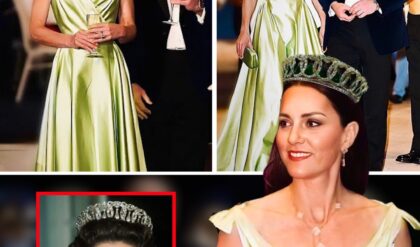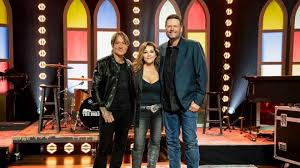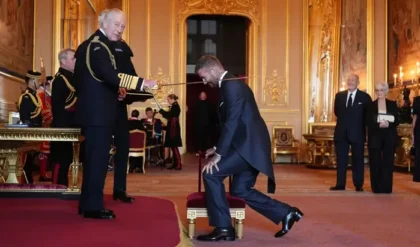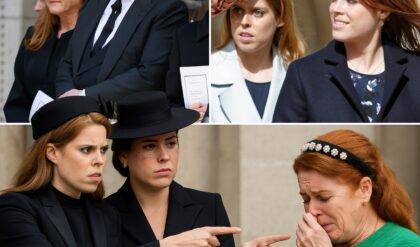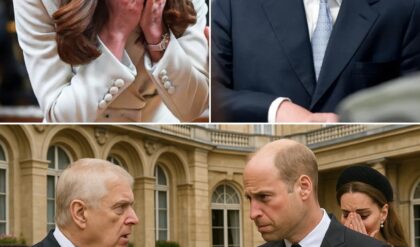In the heart of Nashville, where the neon glow of Broadway honky-tonks flickers like fireflies on the Cumberland River, the Music City Walk of Fame stands as a granite testament to the genre’s immortals. On a golden November afternoon in 2025—specifically, Tuesday, November 11, at 1 p.m. sharp—the sidewalk mosaic will expand to honor one of its most enduring sons: Blake Shelton. The Oklahoma-born baritone, whose voice has crooned through two decades of heartbreak anthems and tailgate bangers, will etch his name alongside icons like Dolly Parton, George Jones, and Hank Williams Jr. This isn’t just another plaque in the pavement; it’s a full-circle reckoning for a man who traded Ada, Oklahoma’s dusty backroads for Music City’s relentless spotlight, only to become its reluctant king.
Shelton’s induction caps a year that’s felt like a victory lap laced with introspection. At 49, he’s fresh off a surprise label switch from Warner Bros. Nashville to BBR Music Group, a move that whispers of reinvention rather than retirement. His latest single, a gravelly ode to small-town stubbornness called “Dirt Road Redemption,” is climbing the charts, proving the fire in his belly hasn’t dimmed. But as the ceremony approaches, Nashville buzzes not with spectacle, but sentiment. Friends and insiders paint a picture of a guy who’s equal parts humbled and hazy about the fuss. “Blake’s the type who shows up in flip-flops to a black-tie gala and owns it,” says a longtime collaborator from his Voice days. “He’s not chasing stars—they just keep sticking to him like burrs on a boot.”
The event at Walk of Fame Park, a stone’s throw from the Country Music Hall of Fame, promises to be a who’s-who of twang and triumph. Free and open to the public, it’ll draw a crowd that spills onto 4th Avenue, with performances teased from fellow inductees Old Dominion—whose harmonious bro-country vibes echo Shelton’s own party-starting playbook—and a posthumous nod to Charley Pride, the trailblazing Black pioneer whose barrier-breaking career Shelton has long championed. Songwriter extraordinaire Liz Rose, the lyrical architect behind Miranda Lambert’s gut-punchers and Little Big Town’s harmonies, rounds out the class, her presence a poetic bookend to Shelton’s own hit-making machine. Expect cameos from the unlikeliest corners: Trace Adkins, Shelton’s “Hillbilly Bone” partner-in-crime, is rumored to crash the stage with a duet revival, while Gwen Stefani—Shelton’s wife of four years and counting—has hinted at a surprise acoustic set, blending her pop polish with his country grit.
To understand why this moment lands like a well-timed chorus, you have to rewind to a scrawny kid in Ada, Oklahoma, strumming George Jones covers in smoke-filled dives. Born Blake Tollison Shelton on June 18, 1976, to a car salesman dad and a beauty shop mom, he was the middle child in a family where music wasn’t a luxury—it was survival. Tragedy struck early: At 14, his half-brother Richie was killed in a car wreck, a loss that scarred deep and surfaced years later in the raw elegy “Over You,” co-written with ex-wife Miranda Lambert. It won CMA Song of the Year in 2012, a bittersweet balm that proved Shelton’s gift for turning personal shrapnel into universal salve.
By 16, he’d snagged Oklahoma’s Denbo Diamond Award, the state’s top nod for young talents, and hightailed it to Nashville post-high school in 1994. The city chewed him up at first—demo tapes lost in slush piles, bar gigs that paid in free beer—but persistence paid off. Signed to Giant Records in 2000, he exploded in 2001 with “Austin,” a five-week Billboard No. 1 that lingered like a hangover. His self-titled debut went platinum, blending traditional twang with a modern wink, and suddenly, the rangy 6’5″ crooner with the lopsided grin was country’s new heartthrob.
The hits piled up like hay bales: “Some Beach” in 2004, a cheeky rant on vacation gone wrong that had soccer moms two-stepping; “Home,” a homesick ballad that topped charts in 2008 and tugged at every expat’s bootstraps. By 2010, he’d notched 11 straight No. 1s, an iron streak that included the rowdy “Hillbilly Bone” collab with Adkins, earning ACM Vocal Event of the Year. Albums like Pure BS and Startin’ Fires showcased his range—beer-soaked romps alongside torch songs that could melt vinyl. Critics dubbed him “country’s everyman philosopher,” a guy who could sell out arenas while cracking wise about his own mullet phase.
Then came The Voice in 2011, a curveball that catapulted him from niche radio staple to pop culture colossus. As coach, Shelton’s Oklahoma drawl and dry wit made him the show’s anchor—mentoring nine winners across 23 seasons, from Javier Colon to Bryce Leatherwood. The role netted him a 2017 NATPE Reality Breakthrough Award and endless memes, but it also humanized him. Behind the banter was a mentor who texted pep talks at 3 a.m. and cried harder than the contestants during eliminations. “That show didn’t make me,” he’s said. “It just let more folks hear the songs that do.”
Awards followed like ducklings: 10 CMA trophies, including Entertainer of the Year in 2013; six ACMs, with a Gene Weed Special Achievement nod for his genre-elevating hustle; 29 ASCAP and BMI honors for songwriting muscle; even a People’s Choice win for Favorite Album in 2017, edging out Beyoncé in an all-genre upset. Nine Grammy nods—two for Best Country Album—eluded the win, but they burnished his cred. And let’s not forget 2013’s Sexiest Man Alive title from People, a crown he wore with self-deprecating flair: “I thought they were running out of people.”
Personal chapters wove through the professional tapestry. Marriages to Kaynette Gern (2003-2006) and Lambert (2011-2015) played out in tabloid Technicolor—duets like “Bare Skin Rug” giving way to divorce dust-ups. But 2015’s meet-cute with Stefani on The Voice set sparked a romance that’s endured, from shotgun weddings in Oklahoma to red-carpet arm-in-arms. Their blended family—her three boys, his farm full of rescue dogs—grounds him, a far cry from the bachelor pad anthems of yore. Shelton’s philanthropy echoes that steadiness: The 2013 “Healing in the Heartland” telethon he co-hosted raised $6 million for Oklahoma tornado victims, while his 2018 Blake Shelton Cancer Research Center at OU Children’s Hospital honors a cousin’s fight.
Now, with The Voice in rearview (his 2023 exit was a mic-drop return to roots), Shelton’s pivoting to ranches and residuals. His Ole Red empire—bar/restaurants from Nashville to Gatlinburg—slings burgers and brews with a side of live music, embodying the blue-collar ethos of tracks like “God’s Country,” his 2019 Grammy-nominated rocker that peaked at No. 1 and racked up a billion streams. That song, a love letter to his home state’s wilds, encapsulates his appeal: unpretentious power, the kind that blasts from F-150 dashboards during harvest runs.
As November 11 dawns crisp and clear—Nashville’s fall foliage turning Music Row into a postcard—expect Shelton to arrive low-key, maybe in a flannel and boots scuffed from his Tishomingo spread. The ceremony kicks off with a video montage: clips of “Austin” debuting on TNN, Voice blind auditions devolving into chair wars, and that 2023 Hollywood Walk of Fame star unveiling where Stefani called him her “dream come true.” Speeches will flow—Adkins ribbing his golf game, Lambert sending a gracious video toast, Carson Daly zooming in from L.A. with Voice throwback jabs. Shelton, ever the softie, might choke up thanking Richie, or crack a line about how the star better not trip him on his next Lower Broadway stroll.
But beyond the pomp, this induction is poetic justice. The Music City Walk of Fame, established in 2006 to celebrate Nashville’s global footprint, now claims Shelton as its own—a fitting cap to a career that’s sold 13 million albums, 52 million singles, and billions of streams. It’s not about the hardware; it’s the harmony he’s struck between heartland honesty and Hollywood gloss, proving country can conquer without compromising. As one Nashville fixture puts it, “Blake’s voice is like that first cold beer on a hot day—refreshing, reliable, and gone too quick if you’re not paying attention.”
Post-ceremony, the party shifts to Ole Red, where Shelton’s promised an impromptu set: “God’s Country” thundering into “Neon Light,” maybe a rare “Over You” for the ghosts. Fans will linger on the star, snapping selfies under the Tennessee Titans’ shadow, while Shelton slips away to fish the Caney Fork or tinker with tracks for his next BBR drop—a rumored duets album with Stefani that’s got insiders salivating.
In a genre forever chasing its next Garth or Taylor, Blake Shelton’s star doesn’t just mark a milestone; it maps a roadmap. From Ada kid to Music City mainstay, he’s sung America through its messiest, most magical chapters—reminding us that the best legacies aren’t chased, they’re carved, one heartfelt hook at a time. As his name gleams eternal on that sidewalk, Nashville—and country—breathes a collective “y’all come back now,” knowing full well: Blake never really left.
